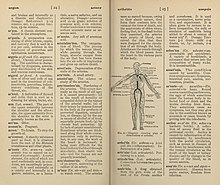Medical dictionary

A medical dictionary is a
Dorland's. Other significant medical dictionaries are distributed by Elsevier. Dictionaries often have multiple versions, with content adapted for different user groups. For example Stedman's Concise Medical Dictionary and Dorland's are for general use and allied health care, while the full text editions are reference works used by medical students, doctors, and health professionals. Medical dictionaries are commonly available in print, online, or as downloadable software packages for personal computers and smartphones
.
History


The earliest known glossaries of medical terms were discovered on Egyptian papyrus authored around 1600 B.C.[1] Other precursors to modern medical dictionaries include lists of terms compiled from the Hippocratic Corpus in the first century AD.[2][3]
The Synonyma Simonis Genuensis (the Synonyms of Simon of Genoa), attributed to the physician to Pope Nicholas IV in the year 1288, was printed by Antonius Zarotus at Milan in 1473. Referring to a copy held in the library of the
Mondino dei Liuzzi, Serapion, and Pietro d'Abano. Then, as now, writers struggled with the terminology used in various translations from earlier Greek, Latin, Hebrew, and Arabic works. Later works by Jacques Desparts and Jacopo Berengario da Carpi continued building on the Synonyma.[6][7]
Definitions
In medical dictionaries, definitions should to the greatest extent possible be:
- Simple and easy to understand,[8] preferably even by the general public[9]
- Useful clinically[9] or in related areas where the definition will be used.[8]
- Specific,[8] that is, by reading the definition only, it should ideally not be possible to refer to any other entity than the one being defined.
- Measurable[8]
- Reflecting current scientific knowledge[8][9]
See also
References
- ^ Sigerist, HE (1950). A History of Medicine. I. Primitive and Archaic Medicine. New York: Oxford University Press. pp. 298–318.
- ^ Craik, Elizabeth (2017). "The Lexicographer Erotian as a Guide to the Hippocratic Corpus". JASCA (Japan Studies in Classical Antiquity). 3: 3–16.
- ^ a b Ambrose, Charles (2005-04-01). "A Short History of Medical Dictionaries". The Pharos of Alpha Omega Alpha-Honor Medical Society. 68 (2): 24–27.
- PMID 18340862.
- ^ Luke DeMaitre Medieval Medicine: The Art of Healing, from Head to Toe (2013), p. 208, at Google Books
- JSTOR 301784.
- ^ Jacobi Partibus (1500). Summula per alphabetum super plurimis remediis et ipsius (in Latin).
- ^ PMID 9714637.
- ^ PMID 1501306.
